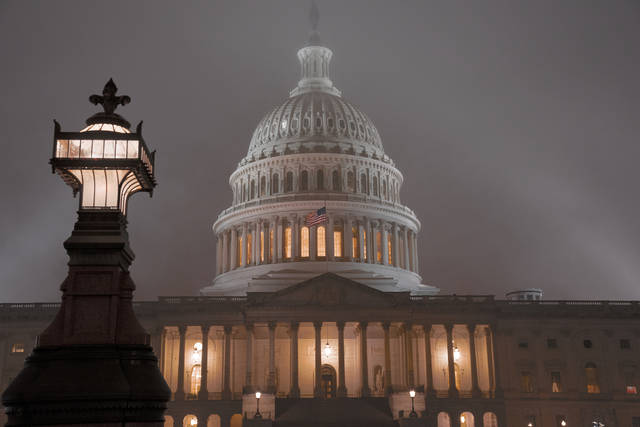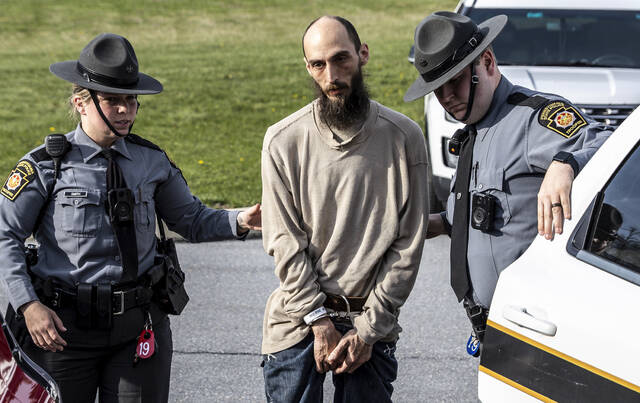A lengthy closed-door briefing by top Trump administration officials Wednesday left senators deeply divided along party lines over whether the president’s assertions of imminent threats were sufficient grounds for killing Iranian Gen. Qassem Soleimani.
Pennsylvania Sen. Pat Toomey, R-Lehigh Valley, told reporters that Trump’s decision was merited and undoubtedly saved American lives. Toomey cited growing Iranian attacks on U.S. allies, the attack on a base in northern Iraq that killed an American contractor and the recent attack on the U.S. Embassy in Iraq as proof of Iran’s growing aggression.
“By killing Soleimani, we disrupted these attacks, and it was important to protect Americans. It was necessary to restore deterrence, to show that if you kill an American, a very, very bad response will follow,” Toomey said.
Like Toomey, Sen. Bob Casey, D-Scranton, has said Soleimani has American blood on his hands and was actively recruiting proxy militias that acted against U.S. interests.
But Casey said Wednesday’s classified briefing left him with too many unanswered questions about the nature of the threat that prompted the killing and how the consequences of it were weighed.
He said officials who participated in the briefing — including Secretary of State Mike Pompeo, Secretary of Defense Mark Esper, the chairman of the Joint Chiefs of Staff, the head of the CIA and the director of national intelligence — left for a White House meeting after 80 minutes but promised to continue the briefing at a later date.
Casey is co-sponsoring a resolution with Sen. Tim Kaine, D-Va., that would prevent the administration from taking further military action against Iran absent a specific war powers authorization from Congress. He said such a resolution would not prohibit the U.S. from defending itself, but it would require a full discussion of any move toward war.
“We know the price Pennsylvania families have paid in war over many generations. In Iraq, 197 Pennsylvanians were killed. In Afghanistan, there were 91. Add the number who served in Iraq or Afghanistan who were wounded, — some of them grievously, permanently wounded — and that number is in the thousands,” Casey said. “We’ve paid a substantial price, and I want to make sure if this or any administration or any congress is pursuing a war against Iran that we make decisions based on what the constitution requires and that we do that in full view of the American people.”
Similar resolutions have failed to attract the 60 votes needed to pass in the Senate. But Casey said he believes his position gained traction with last week’s strike and hopes for a bipartisan vote in favor of the resolution.
A mother’s concern
While President Trump insisted his show of military might and economic sanctions were combining to create a de-escalation of tensions, some Americans remained uneasy as the U.S. deployed another 4,500 soldiers to the region in recent days.
Kathy Myers of Harrison was a little uneasy Wednesday morning as her 20-year-old son, Devin, left home on a bus en route to the John Murtha Johnstown Cambria County Airport for a flight for stateside training.
A member of the 420th Engineer Company (Clearance), U.S. Army Reserve, based out of Indiana, Myers will be deployed to Afghanistan.
His mother said she is relieved to know her son is going to Afghanistan.
Tuesday night, two Iraqi military bases that house American troops took Iranian missile fire in retaliation for the United States killing Soleimani.
“Everyone was asking him, ‘Are you going to go to Iran now?’ and he said, ‘No.’ That gives me a little bit of comfort knowing that they can’t change his orders, but it’s still just an awful feeling in your stomach not knowing what will happen and what’s going on,” she said.
Officials said there were no casualties in the attack on the American bases in Iraq.
But for some it stirred memories of a 1991 Scud missile attack in the first Gulf War on the 14th Quartermaster Detachment. The U.S. Army Reserve unit, headquartered in Hempfield, suffered the heaviest casualties of that war when the missile struck its barracks in Dhahran, Saudi Arabia, killing 13 reservists and injuring 43.
Capt. Matt Hoffmaster, unit commander of the 14th Quartermaster, said the reserve unit, which also served a one-year deployment to the Middle East in Operation Iraqi Freedom in 2005, had not been advised of any pending deployments as of Wednesday.
Members of the 171st Air Refueling Wing of the Air Force based in Moon Township also are operating at normal status, according to Senior Master Sgt. Shawn Monk, the wing’s operations chief.
“We’re always ready to support and answer the call whenever the call comes,” Monk said.
The wing supports Air Force operations by refueling planes in mid-air and has about 1,200 members based in Moon Township, according to Monk.
He couldn’t speak about any active deployments the wing is participating in but said its members are often deployed for training at areas throughout the country.
The 171st was among the first units deployed in the wake of the 9/11 attacks and refueled the jet fighters that were patrolling the skies of the Eastern U.S. after the attacks in New York, Washington and Shanksville, according to the wing’s online history.
Members of the 171st also supported U.S. operations in Afghanistan and Iraq, among other deployments in the years since 9/11.
Editor’s note: This story was amended to correct a quote from Sen. Bob Casey to reflect he meant to say a war with Iran, not Iraq.
Madasyn Lee and Tom Davidson contributed to this report.








